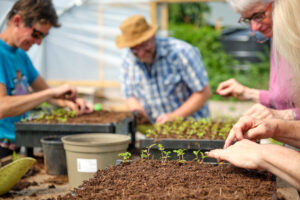Interview: Leila Baker on the future of communities
 Published today (July 10), a new report reveals findings from an 18-month research project which asked communities across the UK, ‘What needs to happen for communities to feel and be more powerful in the future?’, which you can read here.
Published today (July 10), a new report reveals findings from an 18-month research project which asked communities across the UK, ‘What needs to happen for communities to feel and be more powerful in the future?’, which you can read here.
Leila Baker led the research for the Institute of Voluntary Action Research (IVAR), and she spoke to Thomas Barrett about they found.
Where in the UK did you go for your research?
We carried the work out in three dialogues. Firstly, we spoke to people with a single issue of interest in the community, which might be health and equality, ageing, transport or domestic issues. That was very broad.
Then we worked in Northern Ireland, Wales and Scotland which gave us insight from people outside of England.
Then we went to four particular localities. We went to Milton Keynes as an example of a new town which is still expanding; Rotherham, which has a large and diverse population; East Cleveland Villages as a rural example and finally; Merthyr Tydfil, as the post-industrial example.
What surprises came up that you didn’t anticipate?
A good surprise was whilst people told us very clearly that poverty was the number one issue for disadvantaged communities, there are also many reasons to be optimistic.
People are finding ways to make the places they live in better, often in challenging circumstances.
Initially, we didn’t talk to people about education, democracy and power, but those words came back very loud and clear, particularly around political and economic education.
People want to educate themselves about power and the economy and understand how power operates on a local level, so they are able to analyse that and work to achieve the things they want to achieve for their community.
Did you find a generational divide within communities?
Young people said to us they want some space for themselves. A young black woman told me there’s a lot of older white men in charge of a lot of what happens in her community, but the last thing she wants to do is for them to disappear as they’ve been doing it for years and they know how the systems work.
She said she’d like them to work with them to make her ideas part of the community.
How much of an issue was poor internet connectivity for rural communities?
It’s a given that it has to improve. What we say is digital needs to be alongside face to face. Whether that’s through the organisation of welfare or within communities. The two need to go hand in hand.
We need to be open to the possibility that some people don’t want to connect digitally, but some do.
We found great examples such as groups of young women on social media, and other examples where it completely failed. Digital is right for some groups and not for others.
Do people still believe in the concept of community spirit?
We were absolutely clear that communities are really suffering the effects of poverty and the impact of austerity.
It’s a bleak picture we pulled back, and it’s not necessarily very helpful painting that picture, but that’s what we got back.
There is a huge amount of commitment and energy for communities to face the challenges. That does exist and that’s fantastic. But there’s a limit to what you can expect communities to do on their own. Policies and investment are needed too.
What creative things did you find communities doing under the shadow of austerity?
We came across an interesting arts festival in Milton Keynes that was set up by a gentleman who observed that young Muslims in the press were often portrayed very negatively and not showing what they were really like and what their religious culture was.
He wanted to find a way to create a different narrative about communities, so he created an Islamic arts festival. We found the role of arts and heritage was really significant in addressing negative narratives about places.
All of the places we went to have experienced these negative narratives, which can be very damaging psychologically as a community.
How do you tackle divisions between different cultures?
We talk about racism and we also talk about othering. By addressing some of the economic stresses you may alleviate some of that.
We also talked a lot with communities about how does it feel to be in a community with new arrivals. What came through again and again was poor attention to infrastructure.
Communities are often expected to welcome new arrivals but they look at the infrastructure around them such as housing or schools, and they are simply not adequate.
In this country, we find it difficult to say that. We’re expecting communities who are already poor and under pressure, to not name the elephant in the room. People seeking asylum move into an area and they have health needs and support needs, we have to address this.















